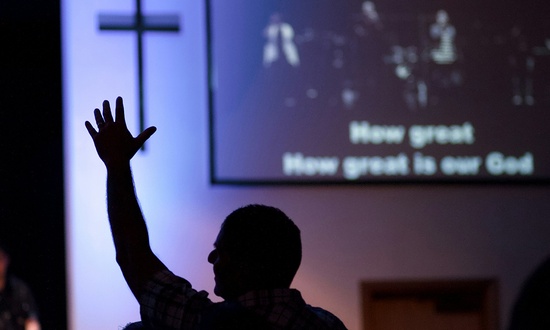Jesus says, “Be careful not to do your ‘acts of righteousness’ before men, to be seen by them. If you do, you will have no reward from your Father in heaven” (Matthew 6:1). The illustrations that follow include prayer and fasting, but begin with giving. When you give to the needy, He says, don’t announce it, as do the hypocrites, who want to be honored by men. Instead, give quietly, not telling anyone, “so that your giving may be in secret. Then your Father, who sees what is done in secret, will reward you” (Matthew 6:4).
I read of a New York fund-raising dinner where people stood up to identify themselves and make pledges to a charitable cause. One man rose, gave his name, his wife’s name, the name of his business, its location, and the kind of merchandise he sold, then loudly announced, “We want to give $5,000 anonymously.”
Showiness in giving is always inappropriate. But sometimes our acts of righteousness will be seen by men and even should be. The world will know we are Christians by our love for each other (John 13:35), but our acts of love must be visible, just as they were when the early Christians sold their property and gave away the proceeds to meet each other’s need. Earlier in the same sermon where He says we’re not to give in order to be seen by men, Christ commands us, “Let your light shine before men, that they may see your good deeds and praise your Father in heaven” (Matthew 5:16).
How can we reconcile these commands? We do so by realizing that Christ’s point is about our motives: Don’t do a righteous act in order to impress people. But when you do a good work, use that opportunity to bring praise to God. What Jesus objects to is not that men would know we give, but that we would give to impress men rather than to please God.
The same principle applies to prayer. Jesus tells us to pray in secret, and God will reward us for that (Matthew 6:6). Yet gathering for group prayer is certainly important (Matthew 18:19-20). God wants us to pray secretly sometimes but not others. He also wants us to give secretly sometimes but not others. It all comes down to the motives of our heart.
Many Christian organizations and churches put contributors’ names on plaques, bricks, pews, and cornerstones. They publish donor lists and name schools and buildings after patrons. This surely encourages the very thing Jesus condemned. It’s hard to understand how we could read this passage and still continue these practices. What are we thinking? By granting the reward of human recognition, we deprive givers of the one reward that would count for eternity: God’s reward.
Studies show that people give more when they get public recognition—but in the Church is that the right thing to do? During a building project years ago, our church elders were considering whether to offer to put givers’ names on individual bricks. One of the elders said, “If we do that, I hope those people really like bricks, because if that’s why they give, it’s the only reward they’re going to get.” Eventually we decided against the idea, because we thought it would tempt people to give for the wrong reasons—and would thereby remove God’s blessing from that building project.
In some circles, “giving” is merely the price of admission for social status. Many people’s businesses have flourished more than the value of their giving through the publicity their giving produces. If this is their motive, then their “giving” is merely a business expense.
I’m always amused at companies that purchase an advertisement for $300,000 to make a big deal out of giving $20,000 to needy kids. Why not just give $320,000 to help the kids and shut up about it? What they’re doing is not about giving—it’s about self-promotion for the purpose of financial gain.
Some use giving to purchase recognition, while others use it to purchase control. They give with strings attached, pulling this string and that, leaving the recipient organization afraid not to comply since it will mean losing future gifts. This is the stockholder mentality. It’s common in local churches where the wealthy can wave their money and lobby for what they want, or strike back by withholding their giving when they don’t get their way. At a church where there was disagreement over who should serve as a new pastor, one board member said, “I’ve poured a lot of money into this church, and I intend to get the pastor I want.” In the truest sense, of course, this man wasn’t giving money to God or the church. He was spending money, under the guise of giving, to purchase control and ego enrichment. God wants quiet and humble givers, not self-serving power brokers.
The best way to avoid exalting givers is to avoid knowing who they are in the first place. There are many reasons for keeping giving anonymous. Most churches have one or two financial secretaries who record donations for tax purposes. These people are the only ones who know who gives what. Other times one or more pastors, elders, or deacons are also aware of giving levels.
There are several reasons why I believe that no one in church leadership should know who’s giving what. If leaders know how much people give, they’ll be tempted to show preference to big givers and neglect those who give less. This is the very trap Scripture warns against, calling it “favoritism” and “evil” (James 2:1-5). Also, it puts leaders in a position of judging others with incomplete knowledge. They may conclude that some people are unspiritual and others are spiritual, without knowing the whole story. (This is different in parachurch ministries, because there is limited direct contact between most ministries and many of their supporters. Consequently, the circumstances do not exist for givers to be compared as readily as they might be in a church, and conclusions are rarely drawn about nongivers.) In some cases, church leaders’ judgments may be accurate, but still unhealthy. Those who have served as financial secretaries carry the burden of knowing when vocal church members whom everyone admires give nothing to the church.
The most important reason for anonymous giving is to remove or at least minimize the temptation to give in order to impress others. If the pastor or the board knows how much I give, I may give in order to impress them. But if I do, Jesus says, I have my reward and will receive none from Him. When I give at my church, I’m grateful there are only one or two people I could be tempted to impress. The fewer the better.
One of the great tests for Christian leaders is whether we can trust God to provide financially without courting or favoring big donors. And perhaps the greatest test for givers is whether we are able to give of ourselves and our resources without getting the credit, concerned only that God gets the glory.
For misrepresenting their giving, God struck Ananias and Sapphira dead (Acts 5:1-10). Keep in mind that they were generous donors. Many Christian ministries today would pay their way to a donors’ conference in a gorgeous hotel in the Caribbean or name a new building after them. If we are tempted to exaggerate our giving or make it appear we’re making more sacrifice than we are, we should take seriously what God did to Ananias and Sapphira!
The Master says, “Well done” to the servant, not for being well known or popular or for getting his name engraved on cornerstones and having buildings named after him. Rather He commends him for being “good” and “faithful.” When we’re true servants, it isn’t about us. We’re like the ox grinding out the corn. We don’t own the corn, and we don’t get credit for growing it. We just do our job and get to eat some of it, and we’re grateful for that. Recognition isn’t what it’s about.







